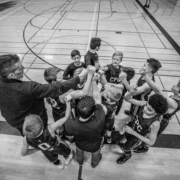*This article was originally written in July of 2019*
I was watching my 9 year-old son, Joey, play basketball. His responsibility was to pass the ball to the player on the wing. For most of the season, and for most of this particular game, Joey was able to accomplish this relatively simple task. However, the opponent changed strategy. They started guarding him much tighter and they began denying his entry pass. This resulted in Joey forcing the pass which was either deflected or intercepted.
Joey likes to please. He’s going to do whatever the coach says, and his job was to throw the ball to the wing. The situation changing didn’t register with him.
I was gritting my teeth in the stands. I believed I could help him by giving instructions. As I watched turnover after turnover I started to rationalize.
“Giving a quick pointer will help the team. It’s not even about my son, it will help them win.”
“He doesn’t need to struggle like this. A quick correction will make the game much more enjoyable.”
“The coach will probably thank me. He’s busy with a lot of other things.”
In my distorted mind, I began to believe giving Joey a tip would be helping not only him, but also the entire team. I started visioning Joey blowing past his defender, drawing help, and dishing off to his teammate for an open layup. We’d teach this other coach a thing or two about hoops. After the layup, Joey would run down the court and point at me for the “assist.” Heck, the coach may turn around and give me a fist bump as well.
Why Coaching From the Stands is a Bad Idea
Being a sport parent can be challenging. It’s not just youth games, you see it in collegiate games as well. Parents, with good intentions, believe that coaching from the stands will be an asset. I can emphatically say it doesn’t help. Here are a few reasons why:
- It Creates Confusion: “Who should I listen to? Dad or the coach?” “Do I disobey the coach or my mom?” The child is put in a lose/lose situation having to decide which authority figure to disrespect.
- Anxiety is Heightened: If a child sees their parents pacing and shouting instructions they become anxious. Even if they weren’t previously nervous, mom and dad’s mental state has been passed on to them.
- Devalues Authority: Not only does it create confusion, it actually encourages disrespecting authority. “Listen to your coach, but only when it serves you.” Not to be dramatic, but this disrespect spills over to other positions of authority: teachers, principals, bosses, and the police.
- Benefits are Minimal: I’ve never seen it help, period. In youth games, I’ve never witnessed a child take instruction from dad and start having tremendous success. In high school and beyond, I’ve seen athletes embarrassed by parents actions, but I’ve never seen positive results.
As I watch my children play I have to remind myself it is their activity, not mine. I’ve had my opportunity to play 10u basketball, now it’s my kids’ turn. Unfortunately, this means I will have to watch them struggle.
Don’t we know the ability to struggle and overcome is a good thing? However, when it comes to our own children it is difficult to let this process play out.
Food For Thought:
- It is critical that game day is for the kids. In fact, I’m a proponent of not attending every game. I view the game as their test day to see what they have learned in practice. As a parent, the time to work on skills and strategy is in between games, not during.
- A lot of us have regrets from our own playing days or childhood. It’s easy to think, “I’m not going to let my kids make the same mistakes as I did.” While wanting better for our children is admirable, it can also turn into an obsession. We start thinking about what we would have wanted, while forgetting our child is their own person possessing their own hopes and dreams.
- It takes a village to raise a child. When they have a coach, teacher or other type of mentor, let them do their job. Sometimes these people will do things differently. That is great. Exposure to different personality types and thought processes is outstanding. It will pay dividends in the long-run.
Final Thought:
After the third turnover I decided to take a walk. I couldn’t watch any longer without saying something. I needed a “parent time-out.”
With 3:00 minutes left in halftime, I saw the coach talking to Joey. Next, he brought over another player and started demonstrating how to set a ball screen. Then they ran through a new play to counter the defense!
What a day for Joey! He learned about failure. He listened to authority and did what was asked of him. He learned how to adjust and overcome obstacles. He took coaching and instruction from someone besides his parents. And, his team went on to win the game. That is learning life lessons through sports!
Boy, I’m glad I took the walk and kept my mouth shut.
Make it a great week,
Mike
P.S. A big shout out to all the youth coaches who volunteer their time. Our kids have been extremely fortunate to have great coaches and role models. Thank you!




Leave a Reply
Want to join the discussion?Feel free to contribute!